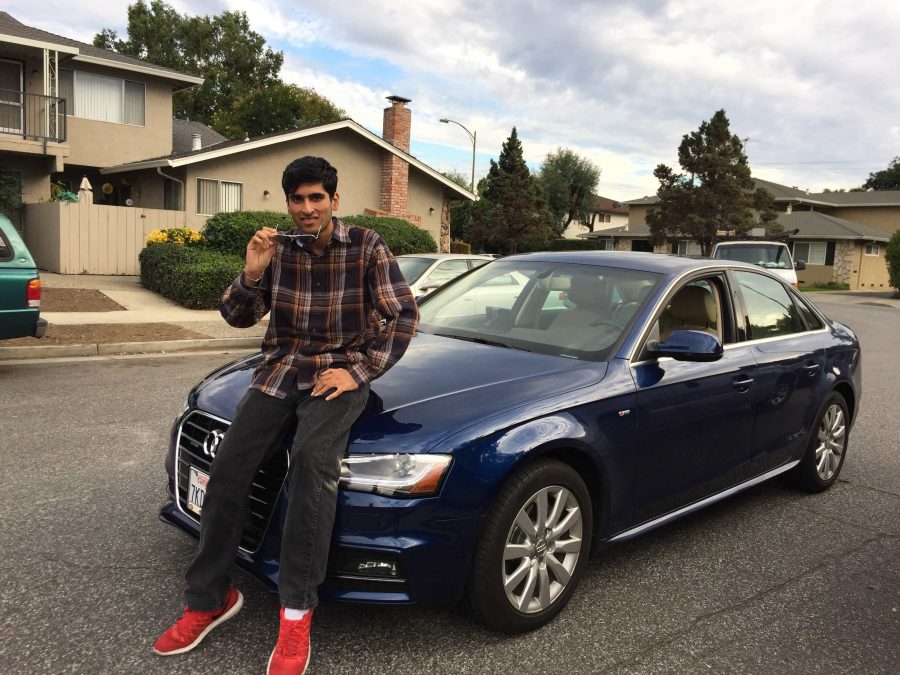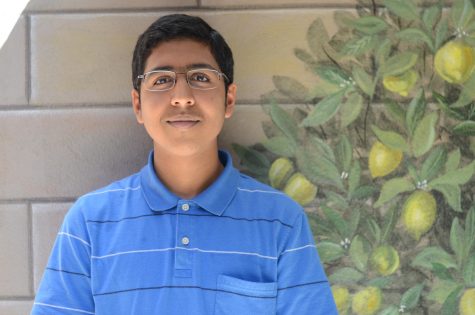Humans of Harker: Karan Walia develops an interest for economics
“You should always try your best. Don’t let other people’s standards define you. I truly believe there’s no life that’s better than yours. At the end of the day, it’s not what cards you get, it’s how you play your cards, so you should trust your intuition, do your part and hope things work out. Even if things don’t work out there’s always another opportunity for everything,” Karan Walia (12) said.
December 23, 2016
By the time Karan Walia (12) took a one-semester economics class in his sophomore year, he knew he wanted a career in finance. But he didn’t start the class like most others.
“When I started economics, it was because [Mr. Lepler] wanted me to try it,” he said. “I didn’t want to because I thought I wanted to go into political science or become a lawyer.”
His later success didn’t come without initial struggles.
“First quiz I remember I got a 7/15 on it, and [my dad] called me over and asked me what was going on,” Karan said. “I said that I had no idea. He told me that we could drop this quiz, but he wanted me to get a 14 on the next one.”
But after the first quiz, Karan quickly found his footing in the class.
“Next quiz comes along and I get a 15, and I’m like ‘whoa, I actually did really well,’” he said. “The dots started connecting and I started to realize that this was what I wanted to do with my life. I really enjoyed the subject. As time went on, the subject got more interesting.”
Karan’s high school career started in debate, when he aspired to become a more outspoken person than who he was in middle school.
“When I was a freshman, I felt like I wasn’t that confident,” he said. “I went to public school until fifth grade, and I didn’t have as much confidence and I was not as outspoken, so I took debate class so I could develop this skill and become a bigger influence on campus. My economics class and my teachers really helped me become the person I am today.”
Karan believes that outspokenness is an essential trait for success.
“I think you should always be able to speak your mind no matter what you’re doing,” he said. “State your opinion, make sure your say matters. Like everything in life, there is a limit. Being too outspoken gives off an arrogant impression, but I do think that being too shy is a bad thing. I feel like I’ve found a reasonable balance between the two extremes.”
Karan delved deeper into his interest of finance by taking up work related to economics.
“Well, for one thing, my father was a banker; he’s retired. He worked for [Bank of America] and Wells Fargo. I’ve also had a job at a bank as a credit analyst intern at the First National Bank of [Northern California] up in San Francisco. I really learned [that] my passion is to help others in the community.”
Rather than continuously focussing on economics-related activities, Karan also has several pastimes.
“I like to work out, play some Xbox, text my friends, play squash and ping pong on the side and work with my dad on his company,” he said. “I love driving, which is the best way to get rid of stress. It can be dangerous if you’re reckless with it.”
At the end of everything, Karan believes that self-drive is one of the most important traits a person can have and that any path in life is possible.
“You should always try your best. Don’t let other people’s standards define you. I truly believe there’s no life that’s better than yours,” Karan said. “At the end of the day, it’s not what cards you get, it’s how you play your cards, so you should trust your intuition, do your part and hope things work out. Even if things don’t work out, there’s always another opportunity for everything.”


















![“[Building nerf blasters] became this outlet of creativity for me that hasn't been matched by anything else. The process [of] making a build complete to your desire is such a painstakingly difficult process, but I've had to learn from [the skills needed from] soldering to proper painting. There's so many different options for everything, if you think about it, it exists. The best part is [that] if it doesn't exist, you can build it yourself," Ishaan Parate said.](https://harkeraquila.com/wp-content/uploads/2022/08/DSC_8149-900x604.jpg)




![“When I came into high school, I was ready to be a follower. But DECA was a game changer for me. It helped me overcome my fear of public speaking, and it's played such a major role in who I've become today. To be able to successfully lead a chapter of 150 students, an officer team and be one of the upperclassmen I once really admired is something I'm [really] proud of,” Anvitha Tummala ('21) said.](https://harkeraquila.com/wp-content/uploads/2021/07/Screen-Shot-2021-07-25-at-9.50.05-AM-900x594.png)







![“I think getting up in the morning and having a sense of purpose [is exciting]. I think without a certain amount of drive, life is kind of obsolete and mundane, and I think having that every single day is what makes each day unique and kind of makes life exciting,” Neymika Jain (12) said.](https://harkeraquila.com/wp-content/uploads/2017/06/Screen-Shot-2017-06-03-at-4.54.16-PM.png)








![“My slogan is ‘slow feet, don’t eat, and I’m hungry.’ You need to run fast to get where you are–you aren't going to get those championships if you aren't fast,” Angel Cervantes (12) said. “I want to do well in school on my tests and in track and win championships for my team. I live by that, [and] I can do that anywhere: in the classroom or on the field.”](https://harkeraquila.com/wp-content/uploads/2018/06/DSC5146-900x601.jpg)
![“[Volleyball has] taught me how to fall correctly, and another thing it taught is that you don’t have to be the best at something to be good at it. If you just hit the ball in a smart way, then it still scores points and you’re good at it. You could be a background player and still make a much bigger impact on the team than you would think,” Anya Gert (’20) said.](https://harkeraquila.com/wp-content/uploads/2020/06/AnnaGert_JinTuan_HoHPhotoEdited-600x900.jpeg)

![“I'm not nearly there yet, but [my confidence has] definitely been getting better since I was pretty shy and timid coming into Harker my freshman year. I know that there's a lot of people that are really confident in what they do, and I really admire them. Everyone's so driven and that has really pushed me to kind of try to find my own place in high school and be more confident,” Alyssa Huang (’20) said.](https://harkeraquila.com/wp-content/uploads/2020/06/AlyssaHuang_EmilyChen_HoHPhoto-900x749.jpeg)







